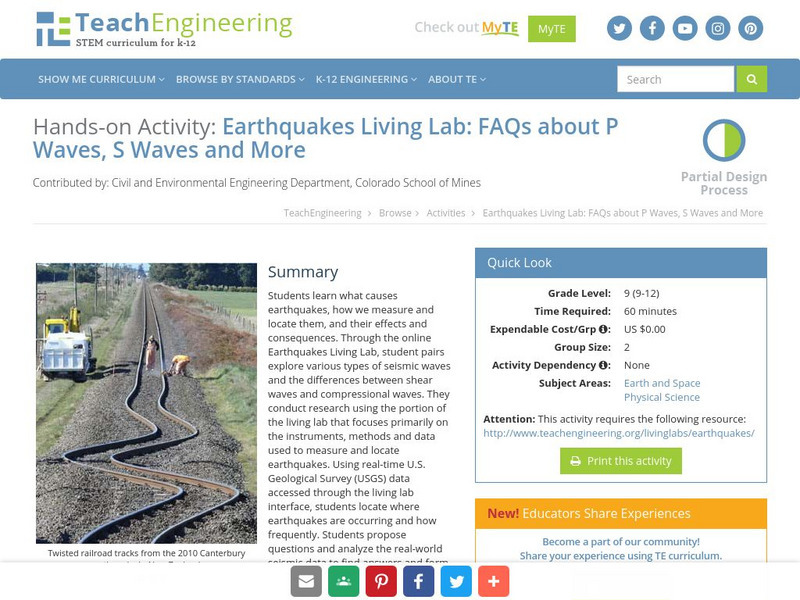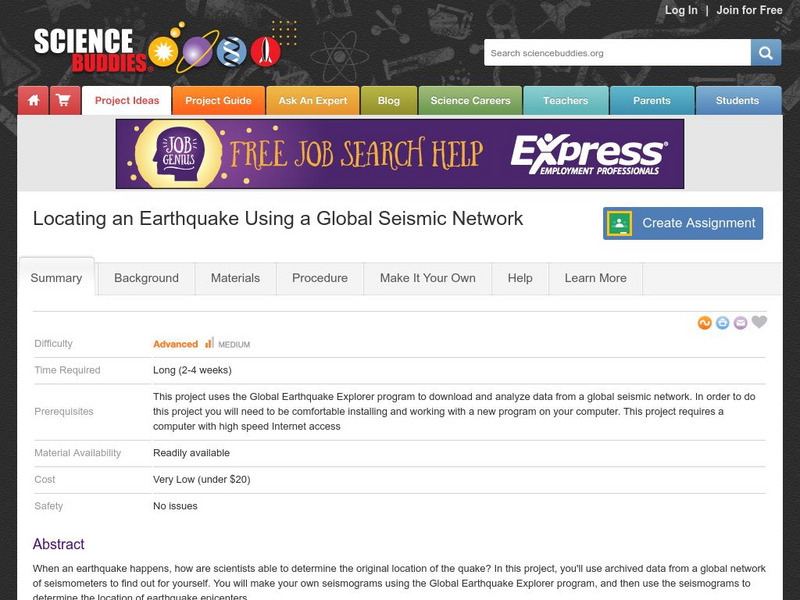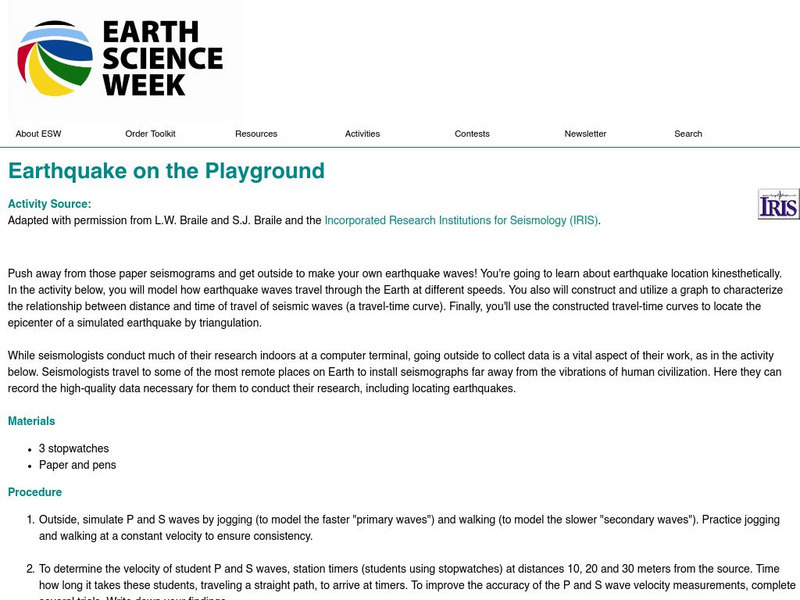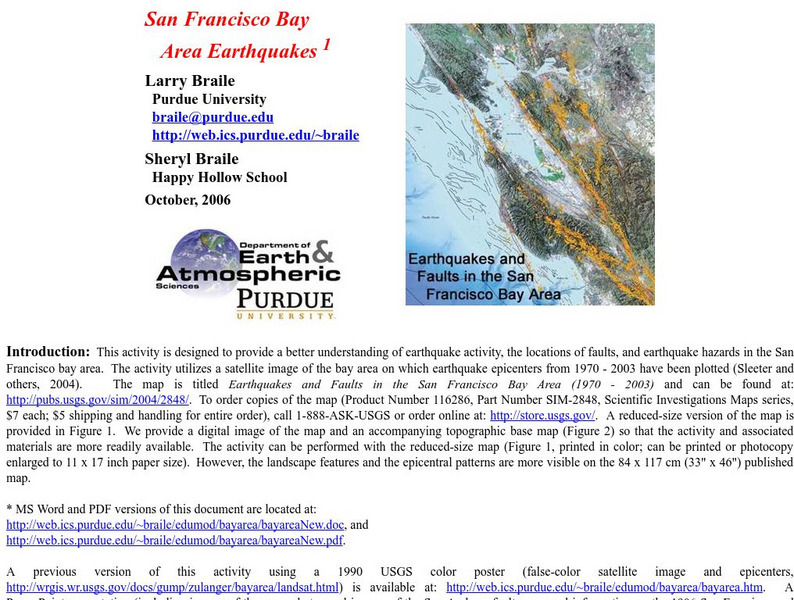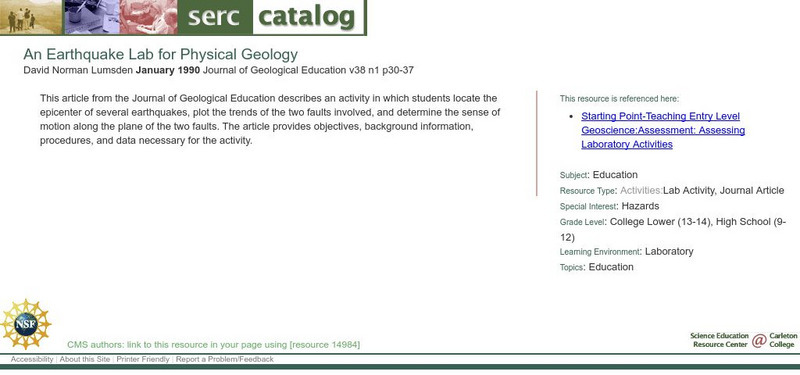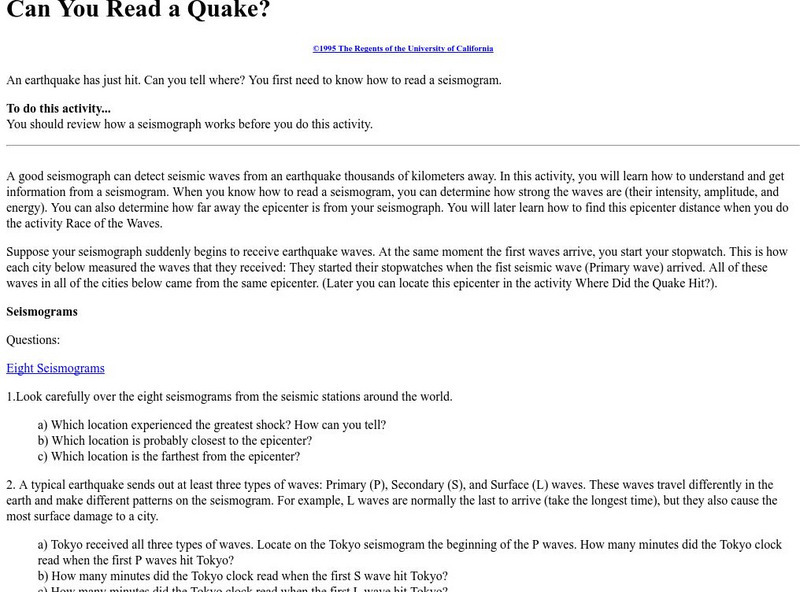Hi, what do you want to do?
Science Education Resource Center at Carleton College
Serc: Subduction Zone Earthquakes
For this lesson, young scholars manipulate a model, consisting of templates on a piece of paper and an overlaying transparency, in order to explore the characteristics of subduction zone earthquakes. In the process, they develop an...
TeachEngineering
Teach Engineering: Earthquakes Living Lab: P Waves, S Waves and More
Students learn what causes earthquakes, how we measure and locate them, and their effects and consequences.
Science Buddies
Science Buddies: Locating an Earthquake Using a Global Seismic Network
When an earthquake happens, how are scientists able to determine the original location of the quake? In this project, you'll use archived data from a global network of seismometers to find out for yourself. You will make your own...
American Geosciences Institute
American Geosciences Institute: Earth Science Week: Earthquake on the Playground
In this experiment, students go outside and create a simulation of P and S waves traveling across a 30-meter span. This is repeated using a 30-meter square. They experiment with P and S wave behavior, record results, and use...
CK-12 Foundation
Ck 12: Earth Science: Locating Earthquake Epicenters Study Guide
This comprehensive study guide covers the main terms and concepts needed for an earth science unit on locating earthquake epicenters. Review questions are included at the bottom of the study guide.
Purdue University
Purdue University: San Francisco Bay Area Earthquakes
Students use geologic fault maps of the San Francisco Bay Area to find relationships between tectonic plate fault lines and landscape features, topographic features, and epicenters of past earthquakes.
NASA
Nasa Space Place: What Is an Earthquake?
Discover why earthquakes happen, how we measure them, and why they only happen on Earth.
National Association of Geoscience Teachers
Nagt.org: A Kinesthetic Demonstration for Locating Earthquake Epicenters
A kinesthetic activity for students to understand the technique for locating the epicenter of an earthquake. It is performed indoors and outdoors in three lessons.
Other
University of Wisconsin Green Bay: Faults and Earthquakes
This site is primarily set up as an outline and is loaded with graphs, maps, and images. It covers a variety of earthquake-related topics, such as what causes earthquakes, fault lines and structures, seismology, a historical look at...
Science Education Resource Center at Carleton College
Serc: An Earthquake Lab for Physical Geology
This article from the Journal of Geological Education describes an activity in which students locate the epicenter of several earthquakes, plot the trends of the two faults involved, and determine the sense of motion along the plane of...
Michigan Technological University
Michigan Tech University: Where Do Earthquakes Happen?
An informative site that explains how and where earthquakes occur and the different types of faults. Contains maps and charts of fault lines, plate edges, and the continental plates. There are other links within the site of related...
Incorporated Research Institutions for Seismology
Iris: How Are Earthquakes Located?
This illustrated fact sheet shows how S and P waves each travel at varying speeds and therefore arrive at seismic stations at different times.
TeachEngineering
Teach Engineering: Earthquakes Living Lab: Epicenters and Magnitudes
Students learn how engineers characterize earthquakes through seismic data. Acting as engineers, they use real-world seismograph data to locate earthquake epicenters via triangulation and determine earthquake magnitudes.
US Geological Survey
U.s. Geological Survey: Rock'n on Shakey Ground [Pdf]
The basics of earthquake science including factual information about how and why they happen. Also includes some hands-on activities and experiments for students.
Science and Mathematics Initiative for Learning Enhancement (SMILE)
Smile: Earthquake Waves and Their Destructions
Looking for the epicenter of an earthquake and measuring the magnitude of waves are goals for students in this lesson plan for intermediate to middle school students. Students get to analyze the P and S waves.
Science4Fun
Science4 Fun: Earthquake
Information about earthquakes including causes and how they are measured.
Science Education Resource Center at Carleton College
Serc: Virtual Earthquake
An activity-based program designed to introduce the concepts of how an earthquake epicenter is located and how the Richter magnitude of an earthquake is determined.
Purdue University
Purdue University: An S and P Wave Travel Time Simulation
A classroom simulation modeling how earthquake waves travel through Earth at different speeds. A graph is constructed to demonstrate the relationship between the distance and time of travel of seismic waves, and then used to locate the...
California Institute of Technology
Cal Tech: The Great 1857 Fort Tejon Earthquake
Basic information about the 1857 "Fort Tejon" Earthquake, along with comparison to other quakes, location of the epicenter, and faults involved.
Other
Vibrationdata: Alaska Earthquake 1964
Time, date, and size of the Alaskan 1964 earthquake. Photos of the damage caused by the quake and the tsunami, location of the epicenter, and a description of the landslides.
University of California
U. Of California Berkeley: Can You Read a Quake?
Eight seismograms and instructions are provided to assist in the learning of how to locate the epicenter of an earthquake.
Oswego City School District
Regents Exam Prep Center: Earth's Interior
A basic overview of the earth's mantle, crust, inner core, and outer core. Also discusses how earthquake waves travel through the Earth.
Other
Matter Project: Seismic Waves
Seismic waves are studied to better understand the ground beneath us, the layers of Earth and points of interest for earthquakes. Better understand the types of waves, what substances they may travel through and how, and gain a clearer...
CK-12 Foundation
Ck 12: Earth Science: Earth's Tectonic Plates
[Free Registration/Login may be required to access all resource tools.] Earth's tectonic plates and how they move.






